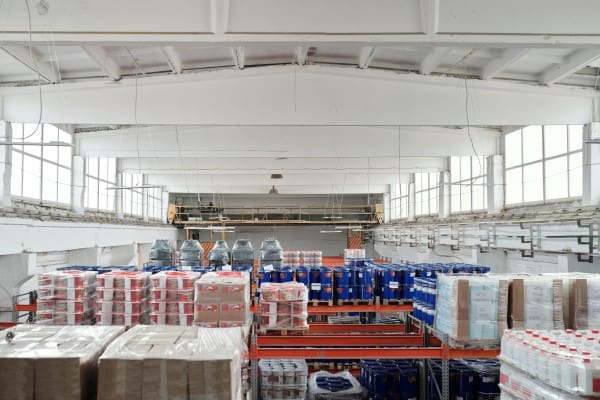This page contains affiliate links. This means if you a follow a link and make a purchase, at no additional cost to you, Humanitarian Careers will receive a commission. Thank you for supporting the site.
Humanitarian logistics covers the purchasing, transporting and warehousing of supplies as part of a response to disaster or conflict. A specialised area within the wider logistics field, humanitarian logistics coordinates the complex supply chains needed to deliver aid in crises contexts.
Working in humanitarian logistics is fantastic career. If you’re looking to enter the aid sector, or transition across to humanitarian logistics from the private sector, read on because we’ve broken down the main logistics job in humanitarian aid as well as some of the top NGOs recruiting each role.
Logistics Manager
The job of Logistics Manager is one of the most senior logistics positions on a humanitarian mission. With oversight of all aspects of logistics implementation, the role of Logistics Manager is to ensure humanitarian aid is procured, shipped, stored, and distributed correctly. Often based in the country office, they also have management responsibility for the logistics team working at field-base level. The humanitarian Logistics Manager will report to the Head Of Mission and to the logistics department at HQ.
If you’re looking to apply to jobs as a humanitarian Logistics Manager, you often require several years of experience within the aid sector. You are also likely to need a formal qualification in logistics or supply chain management, ideally specialising in humanitarian logistics.
Almost all humanitarian organisations recruit Logistics Manager jobs. If you’re looking for Logistics Manager roles in international NGOs, the below are good options. You can also use reliefweb.int to browse a huge range of humanitarian organisations currently recruiting.
- Save the Children
- Norwegian Refugee Council
- Médecins du Monde
- Solidarités International
- Première Urgence Internationale
- Humanity and Inclusion
Supply Chain Coordinator
Supply Chain Coordinator is another senior level logistics job within humanitarian aid. The role focuses on how aid is procured and moved, as well as how it reaches the final point of distribution. Post holders need to oversee complex international supply chains alongside navigating moving aid into conflict and disaster zones. The job of Supply Chain Coordinator on a humanitarian mission will also manage the supply chain or logistics teams across the country and field offices.
Requirements for positions as Supply Chain Coordinators in the humanitarian sector are likely to include several years previous experience. A combination of private sector and NGO work is highly prised. A formal qualification in logistics or supply chain management may also be necessary.
Generally, larger NGOs and international organisations with extensive supply chains recruit for the position of Supply Chain Coordinator. Below are some of the top NGO’s that regularly recruit Supply Chain Coordinator jobs for their humanitarian missions.
- Save the Children
- International Rescue Committee
- International Federation of Red Cross and Red Crescent
- Danish Refugee Council
Procurement Officer
The job of the Procurement Office is to implement the purchasing of humanitarian aid. The role is responsible all aspects of the purchasing procedure including identifying needs, supplier selection, quotations, delivery, invoicing, and payment. A key role within the humanitarian logistics department, the Procurement Officer must ensure the purchase of quality aid supplies alongside managing their delivery to the warehouse or field-base. Larger humanitarian missions will have a Procurement Officer based in the country office.
Procurement Officer jobs are considered mid-level within the humanitarian sector. You are likely to need a few years’ experience in logistics, purchasing or administrative roles. Experience outside the aid sector could be viewed well. A qualification in logistics, administration or business management would boost your application.
Not all humanitarian NGOs recruit Procurement Officer positions as some combine it with into a more generalist Logistics Officer role. However, below are some of the top NGOs that are known to recruit Procurement Officer jobs.
- Oxfam GB
- People in Need
- Save the Children
- International Rescue Committee
- UN Ops
- International Organisation of Migration
Humanitarian Logistics Online Courses
If you are interested in working in humanitarian logistics, we highly recommend the online course Supply Chain Management offered by Rutgers University in New Jersey. The course provides a broad overview of supply chain management and would be a great addition to the CV of anyone applying for humanitarian logistics jobs. Click the link to enrol on the course.
Humanitarian supply chains operate is highly complex and changeable environments. Logisticians in humanitarian crises need to plan in advance of a crisis to ensure aid is pre-positioned and the means to move it into disaster zones is ready. The online course Supply Chain Planning, also by Rutgers University, is one of the best course’s we’ve seen on how supply chain managers, including humanitarians, can plan their logistics. Follow the link to the course’s page for more information
Another great online course for those wanting to work in humanitarian logistics is the Logistics and Supply Chains – Fundamentals, Design, Operations course. It gives students a broad overview of supply chain management that can be applied also to humanitarian contexts. Click the link to the course’s page for more information.
Warehouse Manager
Humanitarian NGOs need to store huge quantities of aid supplies. The position of Warehouse Manager oversees the storing, packing and shipping of humanitarian aid. The job of the Warehouse Manager is also often to set-up new warehouse facilities when a humanitarian response is launched. Managing the warehouse team and reporting to the Logistics Coordinator, the Warehouse Manager must also ensure the security of the NGOs warehouse and the humanitarian supplies stored there.
The job Warehouse Manager is likely to require a number of years’ experience in logistics, warehouse and stock management. It would be possible to move into the position with private sector experience, however humanitarian agencies are likely to prefer candidates with previous humanitarian experience.
Larger NGOs that procurement and store significant amounts of aid regularly recruit Warehouse Manager roles. Humanitarian organisations that also pre-position large quantities of emergency aid are good to target if you’re looking for Warehouse Manager jobs in the aid sector. Some top NGOs to start looking at include:
Logistics Officer
The position of Logistics Officer is the mid-level logistics role within a humanitarian organisation. Usually responsible for the overseeing logistics implementation as a base of operations, the Logistics Officer is one the main front-line humanitarian logistics jobs. Line managed by the Logistics Manager, the job of the Logistics Officer is to oversee the procurement, shipping, storing and distribution of humanitarian aid. They usually line manage the mission’s drivers, housekeepers and security guards.
As said, Logistics Officer positions are considered mid-level within the humanitarian sector. This means two or more years’ experience in humanitarian logistics is preferable. It might be possible to transition into the role with private or public sector logistics experience. Formal qualifications, such as a degree in supply chain management or logistics would help your application.
As a mid-level job in the humanitarian sector, Logistics Officers are usually recruited locally. It is not common to see Logistics Officer positions for expats to deploy internationally. If you are looking for local Logistics Officer jobs with humanitarian NGOs check the local job boards, LinkedIn, or reliefweb.int
Logistics Assistant
Logistics Assistant is the entry-level logistics position in the humanitarian sector. Managed by either the Logistics Coordinator or Logistics Officer, the Logs Assistant is responsible for day-to-day administration. This can include market research, liaising with suppliers, scheduling the fleet or assisting in the warehouse. If you are looking to start a career in humanitarian logistics with limited experience, search for Logistics Assistants’ roles within humanitarian NGOs.
As the Logistics Assistants roles are considered entry-level jobs, limited prior experience is needed. A degree in logistics, ideally with a focus on humanitarian aid would probably be required. A general logistics or administration degree with an additional shorter course on humanitarian logistics would also likely be accepted.
As with the Logistics Officer role, as a junior position within the aid sector Logistics Assistants’ roles are usually reserved for nationals of the countries where projects are being run. Check out the sites where local jobs are advertised to see who is recruiting.
Fleet Manager
The Fleet Manager is responsible for all aspects of the vehicles used by a humanitarian NGO. Humanitarian missions often have a wide range of vehicles that need to be procured, managed and maintained – this is the job of the Fleet Manager. The Fleet Manager is also the line manager of the drivers. The role must ensure the vehicle fleet is scheduled correctly and manages the safety and security of movements throughout the country.
As manager level job, the position of Fleet Manager is considered mid-level within the humanitarian sector. Some years prior experience will be needed, ideally in humanitarian logistics. Private sector experience may help but due to the unique contexts that humanitarian missions operate their fleets in, overseas experience in the aid sector will probably be key.
Humanitarian NGOs that recruit Fleet Managers need to have extensive operations. Generally, very large NGOs recruit this role as smaller ones have the management of the vehicle fleet as part of the Logistics Manager’s job. Some NGOs that are known to recruit Fleet Managers for humanitarian missions include:
- International Rescue Committee
- Save the Children
- Norwegian Refugee Council
- Danish Refugee Council
- International Federation of Red Cross and Red Crescent
Medical Logistician
The job of Medical Logistician is a specialised role within a humanitarian medical programme. The procurement, transportation, storage and distribution of medical supplies requires specific skills and so is overseen by the Med Log. They often work under the supervision of the Logistics Coordinator and can line-manage the Pharmacy Supervisor. The job of the Medical Logistician is to ensure the specifical conditions needed to manage medical supplies are met on a humanitarian mission.
Humanitarian Medical Logisticians require formal qualifications in logistics management for medical humanitarian programmes. They usually have some experience in humanitarian logistics as well. Experience in the private or public sector in a similar role may help, but medical NGOs will look for applicants with some years of humanitarian experience.
Only humanitarian medical NGOs will recruit Med Log jobs. Some of the largest in the sector that often recruit the position are:
- Médecins Sans Frontieres
- Médecins du Monde
- World Health Organisation
- Première Urgence Internationale
- International Medical Corps
Warehouse Assistant
The position of Warehouse Assistant is responsible for the day-to-day running of the supplies warehouse on a humanitarian mission. Warehouse Assistant’s work on all aspects of ensuring the correct running of the warehouse, including receiving, storing, picking, and packing supplies, as well as record keeping. The Warehouse Assistant is either managed by the Warehouse Manager or the Logistics Coordinator. Large humanitarian missions will have a Warehouse Assistant for each base of operations.
Warehouse Assistant jobs are entry-level positions within the humanitarian sector. Limited prior experience is needed, although any previous work in warehousing, storage or logistics, inside or outside the aid sector, will help your application.
As another junior position with the aid sector, humanitarian NGO’s recruit Warehouse Assistants locally. Look for jobs on the common site’s recruitments are advertised in your country.
Pharmacy Supervisor
Health NGO’s need to store significant quantities of medicines and medical equipment to support their projects. The job of the Pharmacy Supervisor is to set-up and manage the pharmacy and medical equipment storage on a humanitarian mission. This includes the correct storage, recording, packing and shipping of medical supplies, as well as an ensuring the security of the medical aid. The job of Pharmacy Supervisor can either be based at the country or field-office level and is line managed by the Medical Coordinator.
To become a Pharmacy Supervisor for a humanitarian NGO you will need formal qualifications in pharmaceutical practice. The job of Pharmacy Supervisor is a mid-level position and so two to three years prior experience should be ample. Experience in the humanitarian sector would be preferable but private or public sector experience may be considered.
The job of Pharmacy Supervisor is usually recruited locally by humanitarian NGOs. Search the sites that most commonly post job adverts in your country for NGOs that are currently hiring.
Logistics-Admin Coordinator
Some smaller humanitarian missions combine the positions of Logistics and Administration Coordinator into a job known as LAD Co. This role oversees logistics, finance and HR management for the mission. They also line-manage any logistics, finance or HR staff at country and field-level. LAD Co post holders are responsible for a wide range of tasks covering all areas of logistics and administration.
As a Coordinator level job, LAD Co positions are considered senior management within the humanitarian sector.
As the LAD Co job combines many functions on a humanitarian mission, it is likely applicants will need significant experience within the sector. Extensive experience in logistics, admin, finance management and human resources will be required, ideally within multiple humanitarian contexts.
Many NGOs setting-up or running small missions will recruit LAD Co positions. Some that have been known to recruit the role include:

Head of Support Services
Support services on a humanitarian mission covers logistics, finance, HR and administration. These functions support the implementation of the aid programmes. The Head of Support Services is a senior management job with overall responsibility for support departments. As part of the leadership team, the Head of Support Services manages the logistics, finance, HR and admin managers. The position is usually based at country-office level, often in the capital city. In some humanitarian organisations the Head of Support Services role also has final oversight of safety and security.
As a senior management position in a humanitarian response, applicants to the job of Head of Support Services will require extensive experience in the aid industry. Technical knowledge covering humanitarian logistics, finance, HR and admin will also be required.
Most humanitarian NGOs recruit senior management roles that oversee the logistics, finance, admin and HR departments. There are different names for these roles, but some that often recruit Head of Support Services jobs are:
Operations Manager
Humanitarian operations focus on the direct implementation of an NGOs projects. The job of Operations Manager is responsible for managing the logistics, finance and HR functions of a humanitarian mission and directing how these support programme delivery. The Operations Manager can have direct management responsibility for the support functions or sit between the support and programmes departments. The role is often based at country office level with frequent travel to the field.
As another senior management role, if you’re looking to work in humanitarian aid as an Operations Manager you will need several years’ experience in similar jobs. Knowledge of, and ideally formal qualifications in, humanitarian logistics would assist in your applications.
Below are some of the top international humanitarian NGOs that recruit Operations Manager jobs.
If you want to learn more about how to get a job in the humanitarian sector, including as a logistician, explore our page on the top humanitarian aid online courses here.






